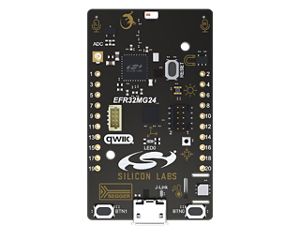xG24-DK2601B
Overview
The EFR32MG24 Mighty Gecko Board dev kit contains a Wireless System-On-Chip from the EFR32MG24 family built on an ARM Cortex®-M33F processor with excellent low power capabilities.

xG24-DK2601B (image courtesy of Silicon Labs)
Hardware
EFR32MG24B310F1536IM48-B Mighty Gecko SoC
CPU core: ARM Cortex®-M33 with FPU
Flash memory: 1536 kB
RAM: 256 kB
Transmit power: up to +20 dBm
Operation frequency: 2.4 GHz
Crystals for LFXO (32.768 kHz) and HFXO (38.4 MHz).
On board sensors:
Silicon Labs Si7021 relative humidity & temperature sensor
Silicon Labs Si7210 hall effect sensor
2x TDK InvenSense ICS-43434 MEMS microphones with I2S output
TDK InvenSense ICM-20689 6-axis inertial measurement sensor
Vishay VEML6035 ambient light sensor
Bosch BMP384 pressure sensor with internal temperature sensor
For more information about the EFR32MG24 SoC and BRD2601B board, refer to these documents:
Supported Features
The board configuration supports the following hardware features:
Interface |
Controller |
Driver/Component |
|---|---|---|
MPU |
on-chip |
memory protection unit |
NVIC |
on-chip |
nested vector interrupt controller |
SYSTICK |
on-chip |
systick |
COUNTER |
on-chip |
stimer |
FLASH |
on-chip |
flash memory |
GPIO |
on-chip |
gpio |
UART |
on-chip |
serial |
TRNG |
on-chip |
semailbox |
WATCHDOG |
on-chip |
watchdog |
I2C(M/S) |
on-chip |
i2c |
RADIO |
on-chip |
bluetooth |
Other hardware features are currently not supported by the port.
Connections and IOs
In the following table, the column Name contains Pin names. For example, PA2 means Pin number 2 on PORTA, as used in the board’s datasheets and manuals.
Name |
Function |
Usage |
|---|---|---|
PA4 |
GPIO |
LED0 |
PB0 |
GPIO |
LED1 |
PB2 |
GPIO |
Push Button 0 |
PB3 |
GPIO |
Push Button 1 |
PA5 |
USART0_TX |
UART Console EFM_BC_TX US0_TX |
PA6 |
USART0_RX |
UART Console EFM_BC_RX US0_RX |
The default configuration can be found in the defconfig file:
boards/arm/efr32xg24_dk2601b/efr32xg24_dk2601b_defconfig
System Clock
The EFR32MG24 SoC is configured to use the 39 MHz external oscillator on the board.
Serial Port
The EFR32MG24 SoC has one USART and two EUSARTs. USART0 is connected to the board controller and is used for the console.
Programming and Debugging
Note
Before using the kit the first time, you should update the J-Link firmware from J-Link-Downloads
Flashing
The sample application Hello World is used for this example. Build the Zephyr kernel and application:
# From the root of the zephyr repository
west build -b efr32xg24_dk2601b samples/hello_world
Connect the efr32xg24_dk2601b to your host computer using the USB port and you should see a USB connection.
Open a serial terminal (minicom, putty, etc.) with the following settings:
Speed: 115200
Data: 8 bits
Parity: None
Stop bits: 1
Reset the board and you’ll see the following message on the corresponding serial port terminal session:
Hello World! efr32xg24_dk2601b
Bluetooth
To use the BLE function, run the command below to retrieve necessary binary blobs from the SiLabs HAL repository.
west blobs fetch silabs
Then build the Zephyr kernel and a Bluetooth sample with the following command. The Bluetooth: Observer sample application is used in this example.
# From the root of the zephyr repository
west build -b efr32xg24_dk2601b samples/bluetooth/observer
